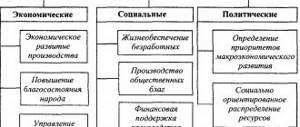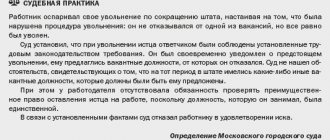Article 11 of the Labor Code is devoted to describing aspects of the use of labor legislation.
It describes both the scope of its application and the cases where the use of labor law is limited. Labor Code of the Russian Federation
dated December 30, 2001 N 197-FZ
Full text of the article, guides, additional information - in ConsultantPlus
Scope and scope
Article 11 of the Russian Labor Code (LC) determines that labor legislation and other regulatory documents, including labor law norms (LA), regulate labor and other relations that are directly related to them. In addition, they may relate to those relationships in which personal labor is used in situations provided for by the code or other legislative acts of federal significance.
The scope of labor law is the area in which its rules are applicable. The scope of labor legislation is quite extensive.
Thus, paragraph 1 of Article 11 establishes that the norms of this branch of law apply to all employees who have entered into employment contracts with employers. This type of contract can be concluded by any person who has legal personality, that is, both a legal entity and an individual who provides the work.
Not all labor relations between employers and employees are formalized properly. The absence of a contract is regarded as non-compliance with labor laws, making the application of its requirements quite difficult. However, a person who does not have a written employment contract is not deprived of the right to provide evidence of the existence of an employment relationship.
Need help from a labor lawyer?
We solve the most complex cases in favor of the client!
+7
What does labor law regulate?
Existing relations arising from this right:
- interaction between employer and employee;
- organizational and managerial relations between the trade union body, representing the interests of the workforce, and the enterprise administration regarding the improvement of working conditions, life and rest of workers;
- redistribution of labor in the labor process;
- employment and employment processes;
- compensation for material damage;
- procedural relations arising when resolving labor disputes.
The following issues relate to labor relations:
- signing an employment contract;
- working hours and working hours;
- working conditions and rest time;
- wages and labor standards;
- guarantees and compensation;
- occupational Safety and Health;
- Institute of peculiarities of labor regulation of certain categories of workers.
Action of TC in space
The effect of labor legislation and other acts containing labor law norms in space and time is fixed by certain norms of the Labor Code of Russia.
The scope of labor law norms in space is regulated by Art. 13 Labor Code of Russia. This article provides the following rules for action in the space of various TP sources:
- the effect of federal laws and other regulatory documents of Russia, which contain TC norms, covers the entire territory of the country. The exception is for documents that provide otherwise.
- The effect of legislative and other regulatory documents that contain TC norms and adopted by various constituent entities of Russia covers the territory of a specific constituent entity of Russia.
- The effect of regulations adopted by local government structures covers the area of the relevant municipality.
- The effect of local regulatory documents, which are adopted by specific employers, applies to the workers they hire, and it does not matter the place where they perform the work.
Commentary on Article 11 of the Labor Code of the Russian Federation
The commented article clarifies the scope of labor legislation and other acts containing labor law norms for a range of persons, gives the relationship between general and special norms, the unity and differentiation of the legal regulation of labor relations.
Part 1 of the commented article indicates relations that are regulated by labor legislation and other acts containing labor law norms, i.e. We are talking about relationships defined by Art. 1 TK. Accordingly, labor legislation and these acts apply to all employees who have entered into labor relations with the employer on the basis of an employment contract (Articles 15, 16 of the Labor Code), as well as to participants (parties) in relations directly related to labor relations. Part 2 of this article determines that they apply to other relationships, provided that they are related to the use of personal labor, if this is provided for in the Labor Code or other federal law. Thus, the effect of labor legislation and other acts containing labor law standards applies to state civil servants and municipal employees with the features provided for by federal laws, other regulatory legal acts of the Russian Federation, laws and other regulatory legal acts of constituent entities of the Russian Federation on state civil service and municipal service (Part 7 of the commentary article).
According to Part 6 of the commented article, the specifics of the legal regulation of labor of certain categories of workers are established only by the Labor Code. In Sect. XII Labor Code contains chapters covering the specifics of labor regulation: women and persons with family responsibilities (Chapter 41), workers under 18 years of age (Chapter 42), the head of the organization (Chapter 43), persons working part-time (Chapter 44), etc.
Part 3 of this article establishes that labor legislation and other acts containing labor law norms are mandatory for application by all employers, i.e. by individuals or legal entities, regardless of organizational and legal forms and forms of ownership, when they enter into labor relations and relations directly related to them (see Parts 3 - 5, 7 - 10 of Article 20 of the Labor Code).
Part 4 of the commented article provides that in controversial cases on the operation of labor legislation, the court makes a decision by determining the legal nature of the controversial relationship. If the court determines that there really is a labor relationship in the presence of a civil contract, then the court makes a decision to apply labor legislation and other acts containing labor law norms to such relationships.
The rules established by labor legislation and other acts containing labor law norms within the territory of the Russian Federation apply to labor relations with the participation of foreign citizens, stateless persons, organizations created or established by foreigners, stateless persons or with the participation of international organizations and foreign legal entities , except for cases provided for by an international treaty of the Russian Federation. The Russian Federation has an intergovernmental Agreement on cooperation in the field of labor migration and social protection of migrant workers dated April 15, 1994 and bilateral agreements.
These acts are valid in accordance with the provisions of the Federal Law of July 25, 2002 N 115-FZ “On the legal status of foreign citizens in the Russian Federation” (as amended on July 18, 2011) <1>, which determines the conditions for the participation of foreign citizens in labor relations in the Russian Federation along with citizens of Russia (Part 3 of Article 62 of the Constitution of the Russian Federation, Article 4 of the said Federal Law). At the same time, a ban has been established for foreign citizens to be in state or municipal service or to be a member of the crew of a Russian warship or a commander of a civil aviation aircraft. They are prohibited from filling positions as part of the crew of a ship sailing under the State Flag of the Russian Federation (in accordance with the restrictions provided for by the Merchant Shipping Code of the Russian Federation dated April 30, 1999 N 81-FZ (as amended on July 19, 2011)) <2>, to be accepted on work at facilities and in organizations whose activities are related to ensuring the security of the Russian Federation (Article 14), federal law may limit the admission of foreign citizens to occupy other positions or engage in other activities. In addition, Federal Law dated July 18, 2006 N 109-FZ “On migration registration of foreign citizens and stateless persons in the Russian Federation” (as amended on July 11, 2011) <3> established the right of these persons to work in the Russian Federation in permitting procedure.
——————————— <1> NW RF. 2002. N 30. Art. 3032; 2003. N 27 (part 1). Art. 2700; N 46 (part 1). Art. 4437; 2004. N 35. Art. 3607; N 45. Art. 4377; 2006. N 30. Art. 3286; N 31 (part 1). Art. 3420; 2007. N 1 (part 1). Art. 21; N 2. Art. 361; N 49. Art. 6071; N 50. Art. 6241; 2008. N 19. Art. 2094; N 30 (part 2). Art. 3616; 2009. N 19. Art. 2283; N 23. Art. 2760; N 26. Art. 3125; N 52 (part 1). Art. 6450; 2010. N 21. Art. 2524; N 30. Art. 4011; N 31. Art. 4196; N 40. Art. 4969; N 52 (part 1). Art. 7000; 2011. N 1. Art. 29, art. 50; N 13. Art. 1689; N 17. Art. 2318, art. 2321; N 27. Art. 3880; N 30 (part 1). Art. 4590. <2> NW RF. 1999. N 18. Art. 2207; 2001. N 22. Art. 2125; 2003. N 27 (part 1). Art. 2700; 2004. N 15. Art. 1519; N 45. Art. 4377; 2005. N 52 (part 1). Art. 5581; 2006. N 50. Art. 5279; 2007. N 46. Art. 5557; N 50. Art. 6246; 2008. N 29 (part 1). Art. 3418; N 30 (part 2). Art. 3616; N 49. Art. 5748; 2009. N 1. Art. thirty; N 29. Art. 3625; 2010. N 27. Art. 3425; N 48. Art. 6246; 2011. N 23. Art. 3253; N 25. Art. 3534; N 30 (part 1). Art. 4590, art. 4596. <3> NW RF. 2006. N 30. Art. 3285; 2007. N 49. Art. 6071; 2008. N 30 (part 1). Art. 3589; N 30 (part 2). Art. 3616; 2009. N 29. Art. 3636; 2010. N 21. Art. 2524; N 31. Art. 4198; N 52 (part 1). Art. 7000; 2011. N 13. Art. 1689; N 27. Art. 3880; N 29. Art. 4291.
The commented article defines the scope of general and special norms enshrined in the Labor Code and other acts. The relationship between general and special norms is manifested in the extension of general norms to all workers, and special norms to certain categories of workers, the features of the regulation of labor relations are related to the nature and working conditions or are determined by other factors specified in Art. Art. 251, 252 TK. Thus, the commented article expresses the combination and correlation of unity and differentiation of legal regulation of labor (see section XII of the Labor Code).
The last part of the commented article defines persons who are not employees who have entered into labor relations, and if they are not employers, then labor legislation and these acts do not apply to them. These include: military personnel, when performing their military service duties; members of boards of directors (supervisory boards) of organizations (with the exception of persons who have entered into an employment contract with this organization in accordance with Article 281 of the Labor Code); persons working on the basis of civil contracts; other persons, if established by federal law.
Effect of labor legislation over time
In addition to the rules on the basis of which labor legislation operates in space, there are a number of rules that determine its operation in time. The general rules establish that the day on which the law or any regulatory document that contains labor standards comes into force is indicated in the document itself or a special act to it. If there is no document indicating the date, then the normative act is considered to have entered into force some time after the fact of its official publication:
- for laws, this period of time is 10 days;
- for presidential decrees and government regulations - 7 days;
- It takes 10 days for regulatory legal acts of executive authorities to come into force.
As for the time of termination of the TC norms, this may be due to:
- with the end of the validity period of a legislative or regulatory document;
- the adoption of another act that has the highest legal force;
- recognition of the adopted document or some of its provisions as having lost their legal force.
The effect of labor legislation and other acts containing labor law norms is not given retroactive force.
Limits of general norms
Article 11 of the Labor Code of the Russian Federation also establishes general provisions on the basis of which legislative norms in the field of labor relations operate. This rule determines that these provisions apply to persons who are participants in labor relations, namely:
- employers;
- stateless persons and foreigners;
- foreign legal entities;
- structures that are created or established by foreigners or stateless persons;
- international companies.
The scope of labor law applies to hired workers of religious structures, but the work of clergy is not regulated by labor legislation.
Limits of validity of technical specifications
Labor legislation has limits in its operation, which are limited by the criteria of time, space and circle of persons. The validity of norms over time requires the precise establishment of the start and end dates of actions, which indicates a clear definition of boundaries, which, as a rule, are established by authorities and management.
The provisions of the Constitution, regarding the regulation of social and labor relations, come into force from the date of publication, based on the results of citizens' voting. Such an event took place on December 12, 1993. The volume of legislative acts that was in force before the adoption of the Constitution and continued to be in effect after its adoption is valid only to the extent that does not contradict the fundamental law of the state. Other provisions have changed or are no longer used.
The Federal Law enters into force on the date established by the decision of the body that adopted it.
Exceptional rules on the procedure for obtaining legal force are provided by regulations adopted by central government bodies. This date depends on a number of factors, including registration with the Ministry of Justice. Such acts, which contain speech about the rights and freedoms, as well as the legitimate interests of citizens, as well as those that are of an interdepartmental nature, in addition to registration, require official publication, which is carried out within 10 days after completion of the registration procedures.
Those acts in respect of which state registration was not carried out, as well as those that were not published, do not carry legal force, cannot cause the creation of legal consequences and regulate legal relations. On the basis of such acts, controversial situations arising in the field of labor relations cannot be resolved.
The effect of norms in space is directly related to territorial boundaries. This means that Russian labor legislation operates within Russia, extending its impact to all organizations and institutions, as well as individuals who have labor relations.
None of the legislative acts differs in greater or lesser force, which means they have the same effect within any subject. In cases where discrepancies are noted between the Federal Law and the law of a separate subject of the Federation, the highest legal force will be established for the Federal Law. The problem of conflict of norms of the same type is resolved in the same manner.
Some regulatory acts of federal significance extend their effect to part of the territories, which may not coincide, including with the territory of a separate entity.
An example is the labor legislation provided for workers performing their functions in the Far North, as well as those areas that are equivalent to it.
The effect of local acts extends only within specific organizations.
Regulatory acts regulating relations between subjects of labor law are characterized by the presence of a criterion for their action depending on the category of workers.
Thus, norms of a general nature apply to the entire composition of employees. Thanks to the use of special standards, the activities of certain working categories are regulated, which include: women, adolescents, workers with harmful or difficult working conditions.
Legislative innovations introduce an additional category of workers, which includes foreigners and persons without a specific citizenship.
The circle of persons to whom the Labor Code does not apply
There are a number of persons who are not covered by labor legislation (the exception is persons who, in the manner prescribed by the Labor Code, are at the same time employers or their legal representatives):
- military personnel who are on military service;
- those who have membership in the board of directors of companies or their supervisory boards (exceptions are individuals who have signed an employment contract with this structure);
- persons who work on the basis of civil contracts;
- other persons, if this is established by the federal law of the subject of Russia.
These categories of citizens are defined by paragraph 6 of Article 11 of the Labor Code. However, this does not mean that TC norms cannot be applied to the military. For example, Article 127 of the Labor Code establishes the right of a serviceman to demand that he be provided with unused days of rest in the event of dismissal, indicating the last day of leave as the date of dismissal.





